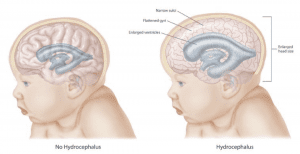People tend to go through emotional transformation once they become parents. The meek find their voice, the cold-hearted turns into a softie, and the unattached feels their heart anchored to a tiny human being.

If there is one thing that all parents fear the most, though, it’s seeing their baby suffer from a severe condition. That’s why most mothers get regular checkups and ultrasounds throughout the pregnancy. That’s why infants go through newborn screening right after birth. The goal is to detect illnesses that might hinder their healthy growth and development.
However, no matter how cautious you are, sometimes life deals you a different deck of cards. It typically happens when your kid’s test results say that he or she is perfectly healthy, but abnormalities begin to show a few months later. This situation often occurs in kids with hydrocephalus, a common brain condition that appears in a 1:1000 ratio.
Hydrocephalus Definition

Hydrocephaly is a neurological disorder, which means “water on the brain” in the literal sense. Figuratively speaking, this so-called water is the cerebrospinal fluid (CSF) that serves as a shock absorber for both the spinal cord and the brain. Due to the imbalance, the tissues forming the latter may receive too much pressure from the liquid and prevent the individual from leading a healthy life.
Symptoms Of Hydrocephalus
A usual telltale sign that someone has hydrocephalus is the swelling of the patient’s head. It occurs because the excess CSF accumulates in the ventricles of the central nervous system, thus engorging the brain and stopping it from developing typically. Some of the other hydrocephalic symptoms include seizures, droopy eyes, lack of muscle strength and coordination, and extreme sleepiness.
Forms Of Hydrocephalus

The hydrocephalus condition comes in various types. The first one is the congenital form, which the doctors can detect since childbirth. As mentioned above, a kid can also obtain the disease after some time, which earns it the term “acquired hydrocephalus.” When a person contracts this illness during senior adulthood, it is proper to call the condition as normal pressure hydrocephaly.
The ailment, moreover, can either be a communicating or non-communicating hydrocephalus. It is s communicating hydrocephalus when the cerebrospinal fluid gets stuck after leaving the ventricles. The brain water can move at this point, though, because the ventricular system does not have blockages.
In case there is a certainty that the ventricles have become blocked entirely, that is the time when you can call it a non-communicating or obstructive hydrocephalus.
Hydrocephalus In Adults
Fluid on the brain may be more common in children, yet it does not entail that no adults are living with this condition as well. According to the statistics released by the Hydrocephalus Association, there are approximately 700,000 individuals in the United States who carry the illness. No less than 80 percent of them, however, end up not knowing that they have hydrocephalus due to failure to diagnose it early.
Treatment

You can find a limited number of studies and procedures concentrated on the disease. The result is that every hydrocephalic person, either a child or a diagnosed adult, need to receive surgery to remove the water on the brain. Quite often, since hydrocephalus remains incurable, going under the knife once does not suffice to get rid of the problem altogether.
Conclusion
Hydrocephalus is a physically, emotionally, and mentally devastating disease. It can affect people of all ages or from diverse walks of life, but the fact that hydrocephalus is more common in innocent babies is most unfortunate. Hopefully, the federal and private organizations will be able to pay attention to expanding the research investigations for it so that nobody has to live with this illness forever again.
FAQs
What is the leading cause of hydrocephalus?
This condition occurs when there is excess cerebrospinal fluid (CSF) builds up in the brain. One of the primary causes is the overproduction of CSF. Also, hydrocephalus may occur due to a blockage in one of the ventricles of the brain, stopping CSF from flowing out. Lastly, the fluid may be unable to filter into the bloodstream.
How long is the life expectancy of someone with hydrocephalus?
If an infant is born with hydrocephalus, they may still live a full life span if they receive treatment early on. Surgery can reduce the excess CSF in the brain. However, adults who develop the condition may have a shortened life span (read further here: https://www.aans.org/en/Patients/Neurosurgical-Conditions-and-Treatments/Hydrocephalus)
Is hydrocephalus can be cured?
No, there is no cure for hydrocephalus. It is, however, manageable and controllable through surgery. The three treatment options are as follows. First is the implantation of a shunt system. Then, endoscopic third ventriculostomy (ETV), and finally, ETV with choroid plexus cauterization (ETV/CPC).
What are the long term effects of hydrocephalus?
Long-term complications of this condition include difficulty in learning, impaired speech, a short attention span, and memory problems. Likewise, there may be visual impairment, as well as problems with organizational skills and physical coordination. Some of those with hydrocephalus may also experience epilepsy.
Is hydrocephalus a disability?
Although the symptoms of hydrocephalus can be severely restricting, the condition itself does not qualify as a disability in most countries. However, the Disability Benefits Center states that a person with this condition may claim benefits if they experience related symptoms due to hydrocephalus. These other conditions may include epilepsy, soft tissue tumors in the neck and head area, and other mental disorders.
Is hydrocephalus inherited?
Future offspring may, in some way, inherit hydrocephalus. However, this is due to inherited genetic abnormalities. For instance, a person may inherit the gene that causes aqueductal stenosis, or the narrowing of the aqueduct, which can block the flow of CSF.
Does hydrocephalus run in families?
In some way, it can run in families. The genetics of parents may make it more likely for their children to develop a problem such as aqueductal stenosis. This condition causes a narrowing of the duct where CSF flows out. Such is the most common cause of congenital hydrocephalus.
Why is hydrocephalus more severe in adults?
The condition can be more severe in adults due to the possibility of having another underlying health problem such as heart disease. Likewise, adults with hydrocephalus may experience other symptoms such as chronic headaches, bladder problems, and difficulty when walking. The patient and the doctor may also not immediately notice hydrocephalus, causing pressure in the brain to continue to rise and result in brain damage.
Does hydrocephalus affect memory?
Hydrocephalus may cause forgetfulness and short-term memory loss. It can likewise inhibit other cognitive issues, creating a shortened attention span, poor organizational skills, and problems concentrating.
How is hydrocephalus detected?
A routine ultrasound can often detect hydrocephalus during pregnancy. After birth, experts can uncover the condition through brain images through magnetic resonance imaging (MRI) and computerized tomography (CT) machines. There are also CSF tests such as a lumbar puncture, intracranial pressure (ICP) monitoring, and external lumbar drainage. These exams determine shunt pressure to see how CSF flows out.
How does a hydrocephalus headache feel?
A hydrocephalus-caused headache may feel somewhat like a migraine. The pain may be severe, lasting for ten to ninety minutes long. They often occur in the late afternoon and can come with nausea, vomiting, and an aversion to light.
Does hydrocephalus cause brain damage?
Without proper treatment, CSF may build up in the brain and cause pressure to increase in the skull. This accumulation can push against brain tissue and cause the head to swell in size. Such can cause further complications such as brain damage, convulsions, and death.
Does hydrocephalus cause depression?
A 2016 study in the oxford journal, Neurosurgery, found that symptoms of depression are common in those with hydrocephalus. However, this evidence does not state that it causes a lowered mood. Likewise, support groups exist for those with this condition as they may experience feelings of depression, anger, or anxiety.
Can a child outgrow hydrocephalus?
Hydrocephalus is a lifelong condition. Although a child may not fully outgrow it in the sense that there is no cure, they can manage the symptoms that come with the situation. They can still live healthy lives as most people do.
Does hydrocephalus cause fatigue?
The symptoms of this condition include headaches, impaired vision, loss of coordination, and also sleepiness. These issues may lead to problems with sleeping and, thus, fatigue. Without the proper treatment to help alleviate the symptoms, the person may continue to feel tired even with enough sleep.
Last Updated on January 12, 2023 by Rejie Salazar
DISCLAIMER (IMPORTANT): This information (including all text, images, audio, or other formats on FamilyHype.com) is not intended to be a substitute for informed professional advice, diagnosis, endorsement or treatment. You should not take any action or avoid taking action without consulting a qualified professional. Always seek the advice of your physician or other qualified health provider with any questions about medical conditions. Do not disregard professional medical advice or delay seeking advice or treatment because of something you have read here a FamilyHype.com.